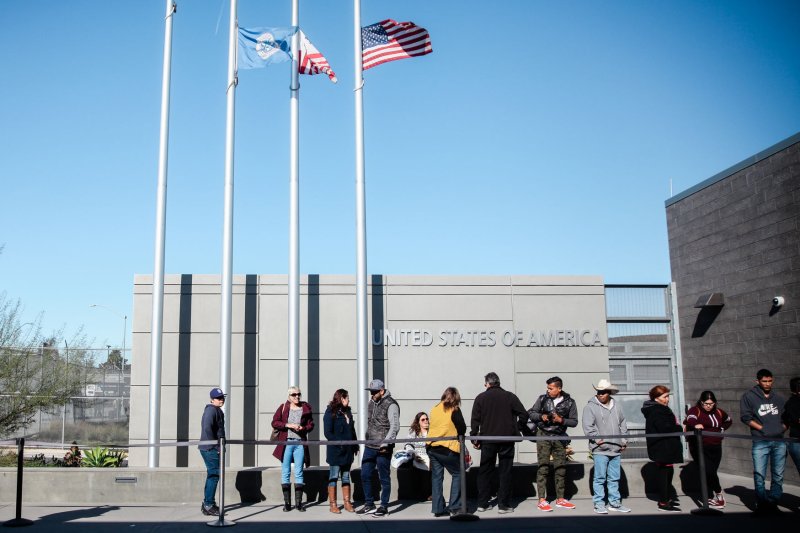1 of 2 | People stand in line at the Port of Entry in San Ysidro, Calif., on December 29. Last week, U.S. Customs and Border Protection began returning asylum seekers to Mexico through San Ysidro to wait for immigration court dates. File Photo by Ariana Drehsler/UPI |
License Photo
MEXICO CITY, Feb. 6 (UPI) -- Mexico's government is sending mixed signals about who it will accept and how it will cope with an influx of migrants forced by the Trump administration to wait in Mexico for U.S. immigration court dates. The "remain in Mexico" policy is adding to a sense of uncertainty and chaos in border cities like Tijuana.
Mexico's Foreign Ministry has said it will accept some, but not all, asylum seekers returned by the United States for "humanitarian reasons" under what are formally called the Migrant Protection Protocols. It will not accept unaccompanied minors and people with health conditions, according to a recent statement.
The National Migration Institute, which is part of Mexico's Interior Ministry, is in a dispute with the Foreign Ministry over key elements of the new U.S. policy.
One key battle relates to the type of migrants the United States could return. Tonatiuh Guillén, head of the institute, said his agency will not accept anybody under age 18 or over 60, while the Foreign Ministry has issued no such restrictions.
The National Migration Institute head has ruled out the return of migrant families. So far, the United States has only returned single adults, even though last week a Department of Homeland Security official told the Washington Post that U.S. Customs and Border Protection soon will start to return migrant families. The official said he expects to expand returns to El Paso/Ciudad Juárez from just Tijuana.
Guillén rejected the idea of expansion to other border crossings, saying Mexico only would accept returned migrants at Tijuana.
"They only thing [the Institute] deals with is the immigration process of entering and exiting," Guillén said, emphasizing his agency could only respond to the situation based on the pro-immigrant approach of Mexico's new government under President Andres Manuel López Obrador.
The new administration says it has placed limits on the types of migrants to be returned to avoid violations of international law, especially the asylum seekers' right not to be repatriated to a country where they risk persecution or torture.
Mexico signaled this new commitment to protect migrants' rights by offering humanitarian visas to Central Americans -- a status that allows them to travel freely around Mexico.
In mid-January, 12,000 Central Americans responded to this offer of visas by amassing at the Mexico-Guatemala border. The high demand for these visas prompted the government to shutter the program, even though it had said it would be permanent.
The migrants said they intend to head to the U.S. border, placing even more strain on Mexican cities like Tijuana and Ciudad Juárez, whose residents have borne costs associated with their housing, feeding and care. On Tuesday, a group of 1,700 migrants arrived in Piedras Negras, Coahuila, just across the border from Eagle Pass, Texas.
Not taking 'responsibility'
Guillén said Mexico cannot pay for services for migrants, who may have to wait in Tijuana for up to three months for their dates in immigration court.
"The United States is not taking responsibility for the costs and which we will have to pay for. It's a challenge, and I don't have an answer. For me, nothing has been resolved," Guillén said during the week that Customs and Border Protection sent the first small groups of asylum seekers back to Tijuana to wait for immigration court hearings.
Guillén admitted the amount of assistance provided to migrants by Mexico's federal government was "small." He said the costs of assisting migrants have mostly been met by municipal governments, like that of Tijuana, and religious organizations. The Catholic Church operates shelters throughout the country and in cities along the border.
"I know this support has limits and I recognize that," Guillén said, "but the problem is what's the size going to be of this migratory flow? This has to be evaluated."
Tijuana Mayor Juan Manuel Gastelúm said his city has received tens of thousands of Central American migrants traveling in caravans over the past year. Gastelúm has been outspoken in calling for Mexico's federal, and not local, authorities to assume the costs associated with migrants at the border. The mayor often has expressed disdain in his remarks about migrants sheltered in Tijuana, calling them "marijuanos" or potheads.
The Baja California state human rights ombudsman has said Gastelúm must apologize for his comments, suggesting they heighten the vulnerability of migrants in a dangerous place. Tijuana is one of Mexico's and the world's most violent cities; in December, two Honduran teens were killed outside the El Barretal migrant shelter.
Guillén did point to one bright spot: the strong labor market in Mexico's northern border cities and the possibility of legal employment for migrants. Mexico's Interior Ministry has said it is replacing the shuttered humanitarian visa program by expanding a work visa program for Central American migrants.
"Many in the migrant caravans have integrated into Tijuana's workforce," Guillén said.
However, Guillén also said he did not know what would happen to Central American migrants who, after waiting in Mexico for their immigration proceedings to conclude, are denied asylum in the United States.
"The U.S. government has to return them to their home countries," he said. "That's the proposal I have heard and it's one of the issues we need to clarify."
Mexico would not pay for their repatriation, Guillén said, emphasizing there were many elements of the remain in Mexico policy that have yet to be decided.















